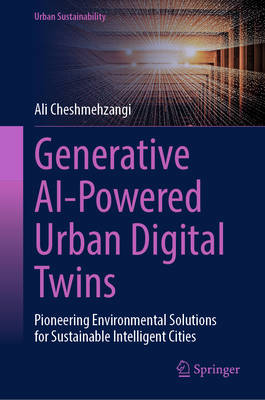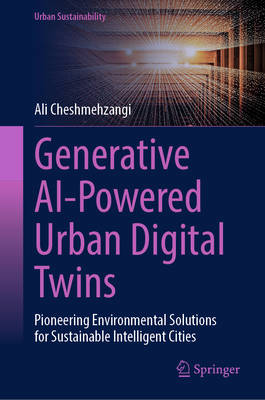
- Retrait en 2 heures
- Assortiment impressionnant
- Paiement sécurisé
- Toujours un magasin près de chez vous
- Retrait gratuit dans votre magasin Club
- 7.000.0000 titres dans notre catalogue
- Payer en toute sécurité
- Toujours un magasin près de chez vous
Generative AI-Powered Urban Digital Twins
Pioneering Environmental Solutions for Sustainable Intelligent Cities
Ali Cheshmehzangi
167,95 €
+ 335 points
Description
This book presents a bold reimagining of urban futures through the convergence of generative artificial intelligence and digital twin technologies. This book presents AI-powered digital twins as catalysts for systemic change, civic empowerment, and environmental regeneration rather than just as planning tools at a time when cities are dealing with growing climate stresses, infrastructure stress, and profound social inequality. This book explores the development of urban digital twins from data-driven models to intelligent, adaptive systems that learn, simulate, and co-design with their urban settings. It does this via eleven technically sound and conceptually rich chapters. It investigates how generative AI may improve climate simulation, manage floods, lessen urban heat, lower emissions, and promote participatory planning, all while posing important ethical, equitable, and governance issues. This book covers open data standards, AI-twin integration architectures, and the difficulties of implementing prototypes into citywide systems, moving from fundamental theory to state-of-the-art practice. It demonstrates how these technologies can be used to depict community-driven urban scenarios, model circular material flows, and build green roofs. Throughout, this book maintains that cities' ability to restore ecosystems, incorporate a variety of viewpoints, and envision resilient and just futures are what truly define intelligence, not efficiency alone. This book promotes a new urban paradigm where ethics are ingrained, intelligence is dispersed, and regeneration becomes the design axiom. It does this while keeping a close eye on both potential and responsibility. This book provides scholars, planners, technologists, and policymakers with a visionary yet doable road map for creating cities that are not just intelligent--but profoundly alive--by drawing on real-world examples, speculative design theory, and systems thinking. This is not a book about managing cities more efficiently. It is a book about reconsidering the basic concept of urban intelligence and co-creating the urban futures filled with care, courage, and collective imagination.
Spécifications
Parties prenantes
- Auteur(s) :
- Editeur:
Contenu
- Nombre de pages :
- 167
- Langue:
- Anglais
- Collection :
Caractéristiques
- EAN:
- 9789819547654
- Date de parution :
- 13-01-26
- Format:
- Livre relié
- Format numérique:
- Genaaid
- Dimensions :
- 155 mm x 235 mm

Seulement chez Librairie Club
+ 335 points sur votre carte client de Librairie Club
Les avis
Nous publions uniquement les avis qui respectent les conditions requises. Consultez nos conditions pour les avis.





